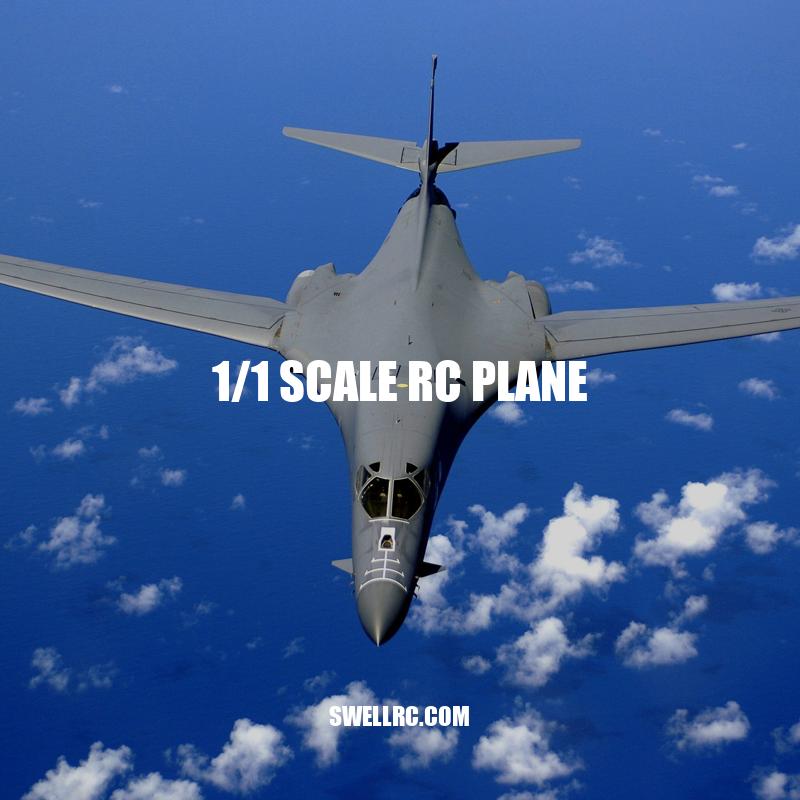Exploring the World of 1/1 Scale RC Planes
Remote Control (RC) planes have been around for decades, and with advances in technology, they have become more sophisticated and realistic, appealing to hobbyists and enthusiasts alike. However, when it comes to RC planes, even the larger models are limited in size due to practicality, transportation, and cost considerations. But what if you could build a full-sized RC plane, that is an exact 1/1 scale replica of an existing aircraft. A plane that can not only fly but can also be controlled remotely. This may sound like a far-fetched idea, but it is actually possible. A 1/1 scale RC plane allows enthusiasts and hobbyists to experience the thrill of flying, while also fulfilling their desire to build, customize and operate an aircraft. From small single-engine planes to larger jet liners, the possibilities are endless when it comes to creating and flying a 1/1 scale RC plane. In this article, we will take a closer look at the 1/1 scale RC plane and explore its potential in the world of RC aviation.
What is a 1/1 Scale RC Plane?
Before we dive deeper into the world of 1/1 scale RC planes, it’s important to understand what they are and how they differ from other RC planes. A 1/1 scale RC plane is a model aircraft that is built to match the exact size and specifications of a real-life aircraft. Here are some of the key characteristics of a 1/1 scale RC plane:
- Exact Replica: The plane is built as an exact replica of a real-life aircraft, utilizing the exact measurements and specifications of the original plane.
- Realistic Appearance: Every aspect of the plane, from the paint scheme to the placement of the control surfaces, is designed to replicate the original aircraft as closely as possible.
- Functional Controls: The plane has a built-in remote control system that allows the pilot to control its movements remotely.
- Unmatched Size: 1/1 scale RC planes are typically much larger than other RC planes, often requiring custom-built hangars or transport vehicles.
- Unique Engineering: Because of their size and complexity, 1/1 scale RC planes require specialized engineering and design techniques to ensure that they can fly safely and effectively.
Despite the challenges associated with building and flying a 1/1 scale RC plane, there are a growing number of enthusiasts and hobbyists who are taking on this unique and exciting challenge. Some popular websites and forums where you can learn more about this area of RC aviation include RC Groups, RC Universe, and the ScaleSoaring.com forum. Additionally, there are various companies and vendors who specialize in selling plans, kits, and components for 1/1 scale RC planes.
How to design and build an RC airplane?
Designing and building an RC airplane requires patience, precision, and some technical prowess. Here are some key steps:
1. Determine the type of airplane you want to build: There are many types of RC airplanes, including gliders, jets, and acrobatic planes.
2. Choose the right materials: The type and quality of materials you choose will impact the plane’s durability and performance. Balsa wood is a popular choice for building the frame, while polystyrene foam is often used for the wings and fuselage.
3. Choose the appropriate electronics: This includes the radio transmitter, receiver, servos and motor. It’s important to get electronics suitable to the size of the airplane.
4. Design the airplane: You can use software such as Autodesk Fusion 360, Adobe Illustrator or CorelDRAW.
5. Begin building your airplane: Cut the materials according to the design and follow the instructions to assemble the plane.
6. Test-fly the airplane: Make any necessary adjustments, check for balance and stability, and continue testing the plane until it flies smoothly.
7. Fine-tune the plane: Once the airplane flies, you can make small adjustments to improve its performance and efficiency.
There are many online resources and forums for hobbyists who want to design and build RC airplanes, including Flite Test and RCG. Also, there are various RC airplane kits available on websites such as Horizon Hobby, Tower Hobbies and HobbyKing that are great starter options.
| Website/Store | Description |
|---|---|
| Flite Test | A website dedicated to all things drone and RC airplane related with how-to guides, forums and videos. |
| RCG | A web community of remote control enthusiasts sharing tips, reviews and how-to guides with an extensive forums archive. |
| Horizon Hobby | An online store that sells airplane kits, parts and electronics while also having a great selection of Ready To Fly (RTF) options for beginner pilots. |
| Tower Hobbies | An online store that sells airplane kits, parts and electronics with the added benefit of live support. |
| HobbyKing | An online store that sells airplane kits, parts and electronics with a large variety of affordable options. |
- Design with software such as Autodesk Fusion 360, Adobe Illustrator or CorelDRAW
- Choose appropriate electronics for the size of your airplane
- Check out Flite Test and RCG for online resources and forums
- Consider purchasing an RC airplane kit from Horizon Hobby, Tower Hobbies, or HobbyKing
Building a 1/1 Scale RC Plane
Building a 1/1 scale RC plane is no small feat and requires a significant amount of time, effort, and technical expertise. Here are some of the key steps involved in the process:
- Creating a Detailed Plan: Before construction can begin, a detailed plan must be developed that outlines every aspect of the plane, including its size, shape, and specifications.
- Gathering Materials: High-quality materials are essential for building a 1/1 scale RC plane, including lightweight materials like foam, balsa wood, and fiberglass, as well as more durable materials like carbon fiber and aluminum.
- Constructing the Frame: The frame is the backbone of the plane and must be constructed with precision and care. This typically involves cutting, shaping, and gluing a variety of materials, as well as installing the necessary wiring and electronics.
- Installing the Power System: A powerful and reliable power system is essential for flying a 1/1 scale RC plane. This typically involves installing a gasoline engine or electric motor, as well as a fuel system or battery pack.
- Flight Testing: Once construction is complete, the plane must be thoroughly tested to ensure that it is safe and functional. This may involve testing the flight controls, performing ground tests, and conducting test flights under controlled conditions.
Interesting fact: The world’s largest radio-controlled model airplane is a 1/3 scale model of a B-52 bomber, with a wingspan of 34 feet and a weight of 1,000 pounds.
If you’re interested in building a 1/1 scale RC plane, there are several resources available to help you get started. Many online forums and communities offer advice, plans, and guidance for building and flying these unique aircraft. Additionally, there are several companies and vendors that offer kits, plans, and components for building your own 1/1 scale RC plane. Here’s a table listing some popular options:
| Vendor | Website | Product Offerings |
|---|---|---|
| Sig Manufacturing | https://www.sigmfg.com/ | Kits, plans, and components for a variety of different planes |
| Composite-ARF | https://www.composite-arf.com/ | High-quality composite kits and components for scale RC planes |
| RC Scale Builder | http://www.rcscalebuilder.com/ | Online forums and resources for building and flying scale RC planes |
How do you find the scale of an RC plane?
Most RC planes come with the scale indicated on the product’s packaging or in the product description. However, if this information is not available, the scale can be determined by measuring the wingspan and comparing it to the wingspan of the full-scale version of the plane. Another way to determine the scale is by measuring the fuselage length or the overall length of the plane.
If you are looking for more information about RC planes and their scales, you can check out websites such as Horizon Hobby or RC Planet. These sites offer a wide range of RC planes, including scale models, and provide product details and specifications. Additionally, online RC plane communities like RC Universe or RC Groups can be a great resource for discussing and learning about RC planes and their scales.
| Website | Description |
|---|---|
| Horizon Hobby | Offers a wide range of RC planes, including scale models, and provides product details and specifications. |
| RC Planet | Offers a wide range of RC planes, including scale models, and provides product details and specifications. |
- Measuring the wingspan and comparing it with the real version can help determine the scale of an RC plane.
- Measuring the fuselage length or overall length of the plane can also help determine the scale.
- Horizon Hobby and RC Planet are websites that offer a wide range of RC planes, including scale models, and provide product details and specifications.
- Online RC plane communities like RC Universe or RC Groups can be a great resource for discussing and learning about RC planes and their scales.
Flying a 1/1 Scale RC Plane
Flying a 1/1 Scale RC Plane is a thrilling experience that requires skill, precision, and careful planning. Here are some things to keep in mind when it comes to flying a 1/1 Scale RC Plane:
- Choose the Right Location: Flying a 1/1 Scale RC Plane requires plenty of room, so it’s important to choose a location that is spacious and free from obstructions like trees and buildings.
- Have a Ground Crew: It’s important to have a skilled ground crew that can assist with takeoff and landing and help monitor the plane during flight.
- Check the Weather: Weather conditions can greatly impact the performance and safety of a 1/1 Scale RC Plane, so it’s important to check the forecast in advance and avoid flying in hazardous conditions.
- Use a Proper Radio System: A reliable and high-quality radio system is essential for controlling a 1/1 Scale RC Plane during flight. Be sure to use a radio system that is designed for use with larger RC planes.
- Start Easy: If you’re new to flying a 1/1 Scale RC Plane, start with basic maneuvers and gradually work your way up to more advanced moves.
If you’re interested in learning more about flying a 1/1 Scale RC Plane, there are many resources available online. These range from online forums and communities where experienced pilots can offer advice and guidance, to instructional videos and tutorials that provide step-by-step guidance on everything from takeoff and landing to more advanced flying maneuvers. Here’s a table listing some helpful resources:
| Resource | Website |
|---|---|
| RC Universe | https://www.rcuniverse.com/ |
| RC Groups | https://www.rcgroups.com/ |
| Flite Test | https://www.flitetest.com/ |
Is flying RC planes fun?
Flying RC planes can be a lot of fun. Here are some reasons why:
- It’s a great way to spend time outdoors and enjoy the fresh air.
- RC planes come in various sizes and designs, providing a range of options for flying enthusiasts.
- Mastering the art of flying is a challenge, which adds an exciting element to the hobby.
- There are plenty of supporting groups and forums where you can ask questions and share your experiences with other enthusiasts.
- Many websites and stores offer a wide range of RC planes, from beginner models to expert level planes with intricate features.
If you’re interested in trying out RC planes, consider visiting hobby stores or online websites such as Horizon Hobby or RC Planet for more information and options.
The Future of 1/1 Scale RC Planes
As with many areas of technology, the field of 1/1 Scale RC Planes is constantly evolving and there is great potential for the future. Here are a few things to keep in mind when it comes to the future of 1/1 Scale RC Planes:
- Innovation in Design: With advancements in material science, we can expect to see more durable and lighter materials being used in the construction of 1/1 Scale RC Planes. This will allow for greater maneuverability and flight capabilities.
- Improved Aerodynamics: As more is learned about aerodynamics and the physics of flight, we can expect to see significant improvements in the design of 1/1 Scale RC Planes. This will lead to more stable flight characteristics and greater control.
- Advances in Electronics: As electronics continue to improve, we are likely to see more sophisticated control systems and on-board sensors being used in 1/1 Scale RC Planes. This will enable more precise control and monitoring of the plane during flight.
- Increased Accessibility: As the technology becomes more affordable and accessible, we can expect to see a wider range of people becoming interested in 1/1 Scale RC Planes. This will likely lead to an increase in the availability of resources and communities dedicated to this activity.
If you’re interested in keeping up-to-date with the latest news and developments in the field of 1/1 Scale RC Planes, there are several websites and resources that you might find helpful. Here’s a table listing a few of these:
| Resource | Website |
|---|---|
| RC Universe | https://www.rcuniverse.com/ |
| RC Groups | https://www.rcgroups.com/ |
| Model Airplane News | https://www.modelairplanenews.com/ |
How long can a RC plane last?
The lifespan of a Remote Control (RC) plane can vary depending on several factors, such as the quality of the materials used, the maintenance, the use, and the crashes. Generally speaking, a well-made and well-maintained RC plane can last for several years.
Here are some factors to consider:
- The type and quality of materials used in manufacturing
- The frequency and intensity of crashes or hard landings
- The quality of maintenance and repairs
- The type of battery and power system used
- The frequency and intensity of use
It’s important to perform routine maintenance such as cleaning, oiling moving parts, and checking the electrical system to ensure the longevity of your RC plane. Some resources for finding high-quality RC planes include websites such as Horizon Hobby and HobbyKing.
Conclusion
1/1 Scale RC Planes are an impressive feat of engineering and a reflection of the creativity and ingenuity of those who have built and flown them. While they come with unique challenges, the rewards of seeing a 1/1 Scale RC Plane take flight are well worth the effort.
Whether you’re a seasoned RC Plane enthusiast or someone who is just starting to explore this hobby, there’s no denying the excitement and sense of awe that comes from working with these machines. By staying up-to-date with the latest news and advancements in the field and using the resources available to you, you can continue to grow and develop your own skills and knowledge.
If you’re interested in building or flying a 1/1 Scale RC Plane, be sure to take the time to do your research, consult with experienced individuals and follow safety protocols. With the right approach and dedication, you can achieve impressive results and become a part of an amazing community of RC enthusiasts.



